- Home
- Anne Spackman
The Book of Bird and Fairy Stories Page 2
The Book of Bird and Fairy Stories Read online
Page 2
boiled eggs and nuts to eat.
“Have you not seen eleven princes riding through the forest?” Eliza asked as she finished the lunch.
“No,” said the old woman. “But yesterday I saw eleven swans with golden crowns on their heads, swimming in the river nearby.” She led Eliza along until they found the river. Eliza hid herself in the bushes to observe the swans when they would come.
Soon they came flapping in to drink the river water. As soon as the sun left the sky, the feathers fell away, and the swans turned into the eleven princes. Eliza cried out, and ran out from her hiding place. She rushed to greet them, calling them by name. The princes were overjoyed to greet their sister once more.
“We brothers,” said the eldest, “fly about as wild swans, so long as the sun is in the sky; but as soon as it sinks behind the hills, we recover our human shape. Therefore we did not try to cross the sea at first, for fear that we should be turned into men at night and drown, until we found a small rock to stand on. There is barely enough room there for us to stand. Now we live in a fair land across the ocean. We came here to visit our home only for a short eleven days, but we do not stay longer, for fear of our wicked step-mother. How can we take you with us, dear sister, for we have neither ship nor boat.”
“How can I break this spell?” said their sister.
“We do not know,” said her brother.
Eliza remained with her brothers until they turned back into swans again with the morning’s light.
“Have you the courage to go with us?” asked her brother. To-morrow we shall fly away, not to return for a year. Can we carry you over the sea with us?”
“Yes,” said Eliza.
“Then we shall need you to make a net for us to carry you,” said the brother, and then the swans flew away.
That night the brothers and Elliza spent the night weaving a net with willow branches and rushes, until it was strong enough not to break.
When the sun rose the next morning, the brothers lifted the net with Eliza in it high into the air, and as swans they flew, carrying her across the sea. At first she was afraid, but soon she saw ships beneath her like small sea gulls. The clouds around her were like mountains. Soon there were dark storm clouds approaching, and Eliza grew afraid.
At last they came to the tiny rock where the swan princes weathered the night, passing the long evening as eleven princes once more. They landed on the rock not long before turning back into men, and linking arms, they shielded their sister against the gathering storm. The sea dashed the rocks, and sea spray came up into their faces. The storm passed with lightening and no rain, and soon, the rough sea lessened.
The next morning, the swans rose again with their sister in her net. After several hours, Eliza saw land, mountains and a high castle shining in its center. Soon they passed a small village of many churches, and then they came across cedar forests, more mountains, and cities and palaces.
The swans flew down, and Eliza sat on a rock, in front of a large cave.
“Heaven grant that I may dream how to save you,” said Eliza.
She began to pray, and fell asleep. In her dreams she was flying in the air towards a palace in the clouds, a palace of the Fata Morgana, fairies of the sky. A fairy woman met her, a fairy beautiful and radiant and yet she was also like the country woman who had offered Eliza lunch.
“Your brothers can go free if you have courage. Do you know stinging nettle? You will have to gather it off the graves in the churchyard, though they will burn blisters onto your hands. You will have to have to spin them into flax and make eleven shirts for your brothers. When you throw the coats over the eleven swans, the spells will be broken. But, while you are weaving these eleven shirts, though it will take years, you must not speak a single word. For if you do, the words will pierce your brothers’ hearts like daggers. Their lives hang upon your tongue. Remember all I have told you,” and as the fairy finished speaking, she touched Eliza with a burning nettle, that woke her up.
It was daytime again, and near where Eliza slept there was a nettle like what Eliza had seen in her dream. Eliza fell to her knees and cried with thanks to God for what she had learned. Then, she left the cave and went to gather the nettles and to begin her work.
She stole away to the graveyard and gathered nettles off of the graves to spin the flax. The nettles burned blisters on her delicate hands, but still she persevered, in order to save her brothers’ lives.
That night the brothers returned to find Eliza silent as a mouse. The brothers believed that Eliza was stricken by sorcery, perhaps by the evil Queen. But when they saw her burned and blistered fingers, they knew that she was trying to save them, and as the youngest cried, his tears fell upon her hands, easing the pain that Eliza felt.
Some days passed, and Eliza had finished working a little on the nettle coats, when she heard a huntsman’s horn. Stricken with terror, she fled into the cave, gathering the nettles and the shirt that she had finished. The sound of the horn approached, and Eliza heard the bark of many hunting dogs. One of the dogs came towards her, and in a few minutes the huntsmen were standing around her, the handsomest being the King of that country.
He came towards her, never having seen a lovelier young girl.
“How did you come here, young lady?” he asked. Eliza shook her head, but said nothing. She dared not say a word. And she hid her hands, so that the King would not see the blisters and bruises.
“Come with us, and I will dress you in silk and velvet, if you are as good as you appear. I will put a golden crown on your head. You shall live with me in my castle as my wife.” And with this, he lifted her up and put her on his white horse. She wept and wrung her hands, but the King would not leave her there.
The King mounted the horse behind her, and the hunting party galloped away. They came to a fair walled city with a fine palace, and there, the royal attendants bedecked Eliza in jewels and dressed her in fine royal clothes. They put gloves over her blistered fingers and presented her to the court. Eliza appeared so beautiful that all of the court was silent as the King announced his intentions to marry her. However, the archbishop shook his head and whispered that the lovely young woman was a witch who had cast a spell over the King. The King gave a feast, and there was dancing and a festive celebration to follow.
After the feast, the King led Eliza through glorious halls and lovely gardens, but she was sad and would not smile. But when Eliza went to her room that night to sleep, she discovered the nettle bundles on the floor of the room, and she was happier once more. She kissed the King’s hand, which he pressed to his heart, and then she let him take his leave of her.
The next day, the church bells sounded the wedding. Soon there were many guests gathered for the wedding feast. The wicked archbishop whispered still to the King that the girl was an enchantress, but he would hear none of it. After the wedding, Eliza was to be crowned. The archbishop, in his cruelty, placed the crown tightly on Eliza’s head, but she did not cry out in pain, or speak a single word, for fear of her brothers’ deaths.
Time passed, and Eliza grew to love the King. She longed to confide the truth in him, but she could not speak a single word to him. At night she crept away to her chambers to weave the flaxen coats, one at a time. But when she had finished the seventh one, she found that she had no more nettle flax. She knew that she must gather the nettles again that grew on the graves in a churchyard, and she set off in the middle of the night to gather some more. Binding her robe about her against the wind as tightly as she could to keep out the cold night air, she set off to the church yard of the palace. She was afraid and quiet in the night, afraid to be watched and misunderstood, for what she was doing was very strange indeed, and might have been mistaken for witchcraft.
She did not know that the archbishop had seen her. The next day, he told the King what he had seen. The King maintained Eliza’s innocence, but there was doubt in his heart. For Eliza went away every night to her
own chamber, with no explanation. As the days passed, the King grew more and more suspicious of her. In time, Eliza’s work was nearly done, but as the last coat was being woven, she discovered that she had no more nettle flax.
Alas, one more time she knew she would have to venture into the churchyard at night. Eliza left, resolute, but this time the archbishop and King followed her. They saw her vanish into the churchyard, and knew she was up to some witchcraft.
The following day, the people condemned Eliza to be burned alive as a witch. She was led away to a dark cell, and there she was given her coats of nettle to cover her.
Eliza was full of small hope then, for she knew that she had not had the coats of nettle flax taken away from her. She continued to weave the coats of flax, bearing the taunts of boys in the street, and no one offered her any kind word.
Her swan brothers came to the window that night, her last one to live, and she was sad, but they spoke kind words to her as she continued to weave the coats of flax. At twilight, the eleven brothers came and demanded to see the King, but they were told that they were not to be permitted to see him.
The crowds taunted Eliza the next morning as she was brought in a cart to be burned in the city square. Still she had hope, for she was almost finished with her task, and her

 The Last Immortal : Book One of Seeds of a Fallen Empire
The Last Immortal : Book One of Seeds of a Fallen Empire Star Gods: Book Four of Seeds of a Fallen Empire
Star Gods: Book Four of Seeds of a Fallen Empire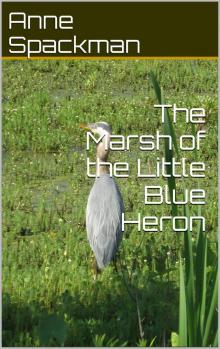 The Marsh of the Little Blue Heron
The Marsh of the Little Blue Heron Cormorant Bay
Cormorant Bay Across the Stars: Book Three of Seeds of a Fallen Empire
Across the Stars: Book Three of Seeds of a Fallen Empire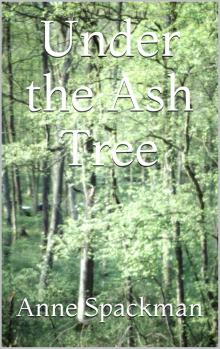 Under the Ash Tree
Under the Ash Tree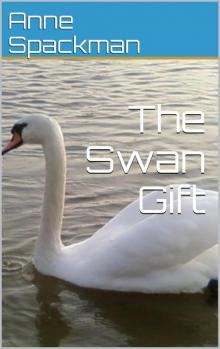 The Swan Gift
The Swan Gift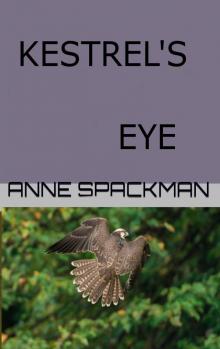 Kestrel's Eye
Kestrel's Eye Caesar and Cleopatra: A Tale of Julius Caesar
Caesar and Cleopatra: A Tale of Julius Caesar The Road to Skye
The Road to Skye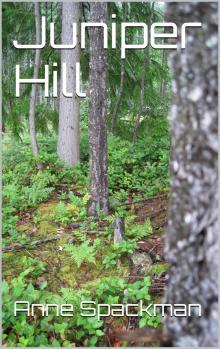 Juniper Hill
Juniper Hill The Empire: Book Six of Seeds of a Fallen Empire
The Empire: Book Six of Seeds of a Fallen Empire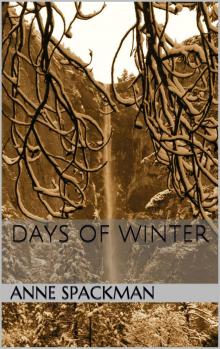 Days of Winter
Days of Winter The Osiris Invasion: Book Two of Seeds of a Fallen Empire
The Osiris Invasion: Book Two of Seeds of a Fallen Empire The Comet Riders: Book Five of Seeds of a Fallen Empire
The Comet Riders: Book Five of Seeds of a Fallen Empire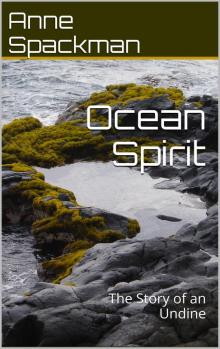 Ocean Spirit : The Story of an Undine
Ocean Spirit : The Story of an Undine What Emma Left Behind
What Emma Left Behind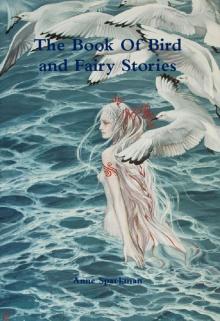 The Book of Bird and Fairy Stories
The Book of Bird and Fairy Stories Blackberry Wine
Blackberry Wine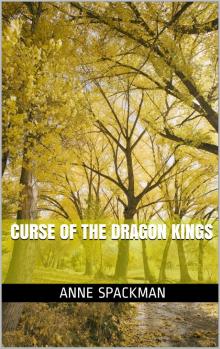 Curse of the Dragon Kings
Curse of the Dragon Kings